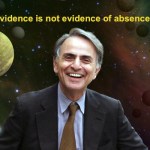scientific
"Never waste your time trying to explain who you are to people who are committed to misunderstanding you." -Dream Hampton
Perhaps no word in the English language generates as much misunderstanding as the word theory. In scientific circles, this word has a very specific meaning that's different from everyday use, and -- as a theoretical astrophysicist myself -- I feel it's my duty to help explain exactly what we mean when we use it. In this week’s Ask Ethan column, I'm pleased to pull out of our question/suggestion box the question of Ripley, who asks:
I often see that…
"There could be no fairer destiny for any physical theory than that it should point the way to a more comprehensive theory in which it lives on as a limiting case." -Albert Einstein
Imagine: you've worked hard all your life, through your primary and secondary school education, where you worked hard to get into a good college, through your undergraduate degree, where you found something you were passionate enough about that you wanted to study it even further, and then through graduate school, where you spent half-a-decade or more immersing yourself, non-stop, in an area of research in a field…
"I prefer to be true to myself, even at the hazard of incurring the ridicule of others, rather than to be false, and to incur my own abhorrence." -Frederick Douglass
I thought we were past this, I really did. Having grown up in New York, having lived in eight different states and traveled to 39 others -- as well as maybe a dozen different countries -- I truly thought there were a few things that were obvious. One of them, of course, is that you've got to give something a shot to know whether you like it or not. Hopefully, no matter who, where, or what you are, you'll enjoy this upbeat song by…
"You don't use science to show that you're right, you use science to become right." -Randall of xkcd
In January of 2008, I began writing this blog, Starts With A Bang, both for myself and for all of you, because we all have something in common.
Image credit: © Stéphane Guisard, "Los Cielos de Chile", via astrosurf.com.
The same planet, the same heavens, the same laws of nature and the same Universe are something that we all have in common. And all of us, no matter how intrinsically smart, talented, or brilliant our instincts are, come into this world knowing absolutely…
When I think of molecules, I think of Conan O'Brien doing his skit where he plays Moleculo...
the molecular man! I don't think of astronomy, and I certainly don't think of the leftover radiation from the big bang (known as the cosmic microwave background)! But somebody over at the European Southern Observatory put these two together and made an incredibly tasty science sandwich.
See, we can measure the cosmic microwave background today, because we have photons (particles of light) coming at us in all directions at all locations, with a temperature of 2.725 Kelvin. Theoretical cosmology…
Sometimes, I publish things on this website that are not entirely correct (and when I do, I'll own up to it). Sometimes other people do on theirs. There are bad ways and good ways to argue these points, ranging from name-calling to explicitly explaining where the flaws are in one's arguments, and what the corrections are.
And I had no idea how I was going to articulate this. But then Lucas pointed this chart out to me, and it does a better job of explaining it than I ever could.
You know who could explain this? Captain Picard. Imagine you got to be a Starfleet officer. Here's what he has to…
Bret Underwood, a friend of mine from my time in Madison, WI, saw my post on String Theory, and took issue with my statement that it wasn't testable. I'm still standing behind what I said, but let's address what Bret has to say.
I donât understand your argument above for why string theory is untestable. In fact, it seems to me you just outlined the best possible case for string theory! What you said above is that if I have a string theory construction of a phenomenon (say, the Standard Model or Inflation), which uses a set of parameters X, and makes some predictions, then I can find another…
Okay, so I got a question from my friend Tamara, who's a high school teacher in my hometown of New York City. It concerns a recent article she read on the front page of the New York Times about something funny that us scientists are calling Boltzmann Brains.
I've read this article three times since it was featured on the front page of the science section in the NYT and I'm still confused about the Boltzmann brain problem, it's (non?)validity, the reason it made it's way onto the front page and whether Emerson's philosophy about imagined worlds came from this...
There's a lot of interesting…




